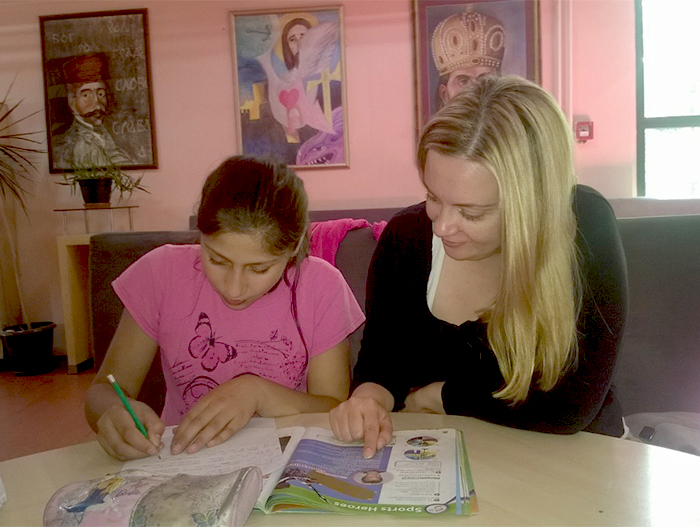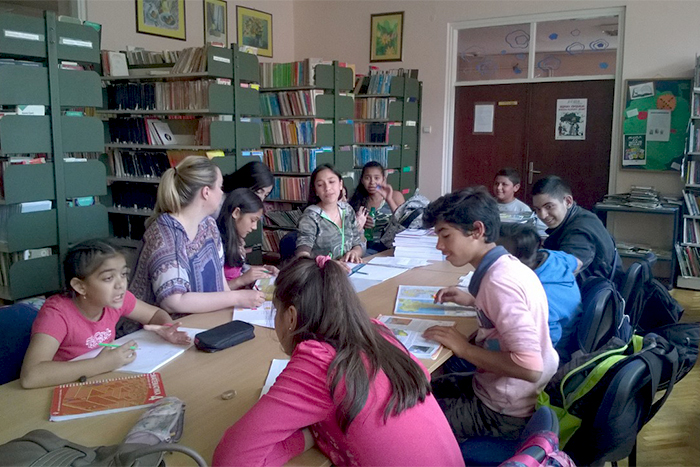 North West Balkans
North West Balkans
Languages
Teach me to understand, so that I could know

There are numerous reasons for dropout of Roma children from the education system – poverty, lack of parents’ interest, distance from schools, learning difficulties, being forced to work… On the other hand, Roma children that do stay in school face a lot of learning difficulties, including how to read or write and how to read with comprehension.
In order to tackle both issues, Save the Children partnered up with NGO Mali princ (Little Prince) from Belgrade, Serbia, to help reduce Roma students’ dropout in primary schools “Despot Stefan Lazarevic” and “Pavle Savic” and to ensure Roma students are provided with learning support in order to achieve better results in school.
Project “Teach me to understand, so that I could know” consist of three pillars: the first pillar involves direct support of Roma children by organizing educational workshops, while the second pillar focuses on outreach work with targeted Roma families and support to Roma children in learning in their households along with their parents/siblings engaged in the learning process in order to strengthen parents’ capacities/skills to provide learning support for their children. The third pillar of the intervention is advocacy for scaling up this model in other schools in Belgrade and for inclusion of Roma children in Students’ Parliaments as well as inclusion of Roma parents in Parents’ Councils in schools.
Decreasing dropout of Roma children is being achieved through ensuring better results and integration of Roma students from I-VIII grade, as well as through increasing awareness among Roma parents about the importance of education for their children.
“Ensuring learning support to Roma students is of key importance – better results in school make them more confident and proactive, enabling their full inclusion in the society. Additional support is crucial because Roma parents are often uneducated, sometimes illiterate and are rarely able to help their children with the curriculum even when they really want to. These issues are the potential causes of dropping out of school,” stresses Andrea Zeravcic, Save the Children in North West Balkans Director.
When Aida* became beneficiary of the project, she was considered as being at risk of school dropout. Her family are refugees from Kosovo, she lives with her parents, two brothers, sister-in-law and cousins. Aida* is a 5th grader who had a lot of low grades when we first met her, as well as problems with school attendance and behaviour. On top of that, she also has to deal with epilepsy. She was included in the project to address her learning difficulties and to give her support and guidance.
„At first I didn’t want to learn that much, I didn’t like my new teachers and I missed my teacher from the lower grades. Teachers are so strict now in the 5th grade and I was afraid. So I kind of just hang out there because all the teaching assistants were very friendly and supportive and I felt at ease there. Then we had a project in English about my favourite animal and I didn’t have anyone to help me and Jelena offered to help me and my friends and we all did the project together and it was fun. My dad later helped me draw our dog Rocky. Later I heard that some children were included in individual work with parents and children at their home and I asked if my mother and I could have that help also. I really needed the help, I couldn’t cope with school by myself. I had a lot of bad grades, I didn’t have some books, I skipped classes a lot. But I did like the workshops. I was very happy when I was included in individual classes in March,” recalls Aida*.

In 2016, NGO Mali princ organized 57 workshops in “Despot Stefan Lazarevic” and 47 workshops in “Pavle Savic” primary school, encompassing all needed subjects, such as mathematics, physics, Serbian language, English language, geography, etc. Also, 89 out of 95 Roma children included in the project completed their respected grades and enrolled in the next school year. NGO Mali princ takes pride in their achievements in working with Roma children.
“As the project has been progressing, so have we, as an organization, gained important experience. But, the most important thing is the progress that our children have been making. At the beginning of the project implementation, we already knew a lot of children because of our previous projects and activities. We already had a certain level of trust of children and their parents which helped us persuade them to come to our workshops. At the workshops, we created a space where Roma children felt safe, accepted, important and free to take an active part in the learning process, to express their opinion, ask questions and ask for help and explanation when they did not understand something. Working in smaller groups, informal and stimulating atmosphere made the children feel welcome and comfortable,” says Slavica Vasic, NGO Mali princ Executive Director.
Teaching children how to learn and understand the school material proved to be the model that gives the best results.
“Lena* did very well this year and it is because we had help. She even helped her cousin with schoolwork. Before, she couldn’t even read in English and now she can read very well and understands a lot. We are very grateful,” says Vinka*, Lena's* mother.
NGO Mali princ established good cooperation with the primary school “Despot Stefan Lazarevic”. Seeing the improvements in students’ progress, the school staff was open to innovative ideas that could improve children’ situation, in school and their everyday life, help build their capacities and provide them with more opportunities.
“I am very glad we have such good cooperation. Initially, some children didn't know basic calculus. But, together we made some efforts and they didn't fail the subject,” says Jelena Loncar, teacher of mathematics.
In 2016, NGO Mali princ succeeded in expanding the project to another school in Belgrade, after lobbing for this with the local authorities. At the same time, they launched an advocacy initiative aimed at Serbian Ministry of Education to ban education institutions for adults to enrol children below 15 years of age who miss out on mainstream education by attending this type of non-formal schooling. This is important initiative since such practice is against the law and it does not allow Roma children access to appropriate curriculum.
To learn more about the project and hear more from direct beneficiaries, watch the video produced by NGO Mali princ: https://www.youtube.com/watch?v=tc_0gwlLBMQ (with English subtitles).
*Names are changed in order to protect identity.